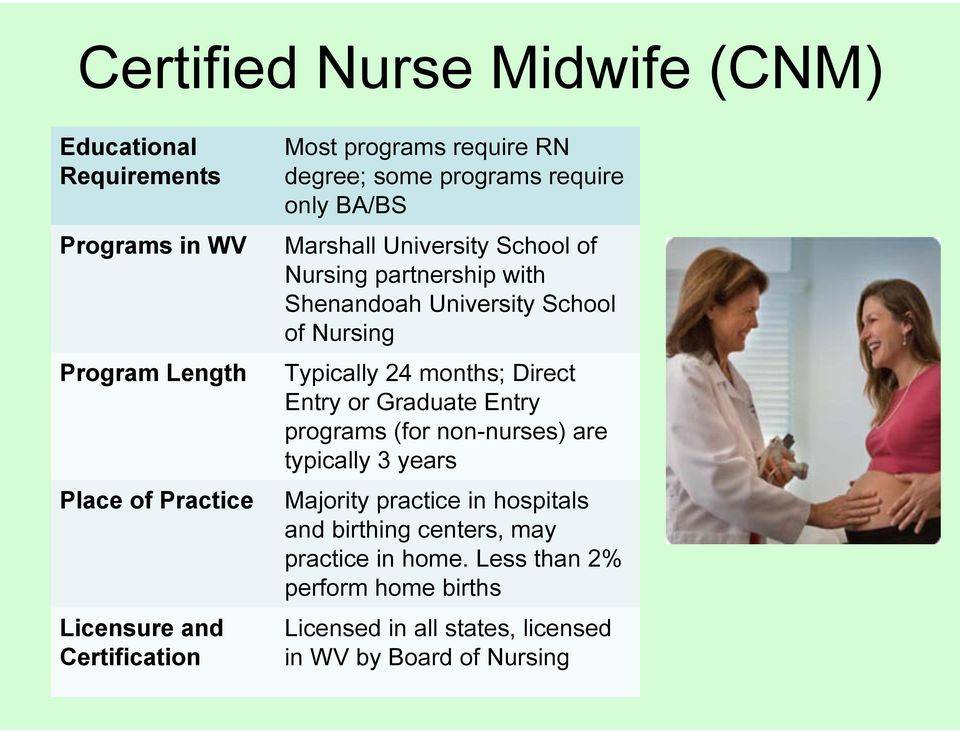Discover the world of Certified Nurse-Midwife (CNMs) in this comprehensive SEO article. Learn about their roles, educational requirements, career outlook, and more. Find out how CNMs influence healthcare delivery and transition to other nursing positions.
Who is a Certified Nurse-Midwife (CNM)?

Certified Nurse-Midwives, or CNMs, are advanced practice nurses who specialize in providing healthcare to expectant mothers, during pregnancy, childbirth, and the postpartum period. They are qualified to handle various aspects of women’s health, including prenatal care, labor and delivery, and gynecological services. CNMs are trained to offer personalized care and often work closely with physicians to ensure the well-being of both mother and baby.
How Long Does it Take to Become a Certified Nurse-Midwife (CNM)?
Becoming a CNM is a rigorous process that requires dedication and commitment. It typically takes around 6 to 8 years of education and training. Aspiring CNMs must first earn a Bachelor of Science in Nursing (BSN), which takes approximately four years. After obtaining their BSN, they need to gain practical experience as registered nurses, which typically takes an additional 1-2 years. To complete their journey, they must enroll in a Master’s of Science in Nursing (MSN) program, specializing in midwifery, which takes about 2 years. After graduation, they must pass a national certification exam to become a CNM. This extensive education and training ensure that CNMs are well-prepared for the complex healthcare challenges they will face in their careers.
What Does a Certified Nurse-Midwife (CNM) Do?

Certified Nurse-Midwives have a wide range of responsibilities focused on the well-being of expectant mothers and newborns. They provide prenatal care, conducting regular check-ups, and monitoring the health of both mother and baby throughout pregnancy. During labor and delivery, CNMs are skilled in assisting with natural childbirth and can manage low-risk pregnancies independently. They also offer postpartum care, ensuring the mother’s recovery and providing guidance on newborn care. Additionally, CNMs are trained to handle various gynecological services, such as family planning, contraception, and routine exams.
How to Become a Certified Nurse-Midwife (CNM)
To become a Certified Nurse-Midwife, one must follow a structured educational and certification path. This involves completing a Bachelor of Science in Nursing (BSN) program, obtaining licensure as a registered nurse, gaining clinical experience in obstetrics and gynecology, and enrolling in a Master’s of Science in Nursing (MSN) program with a focus on midwifery. After completing the MSN program, aspiring CNMs must pass a national certification exam administered by the American Midwifery Certification Board (AMCB). This thorough process ensures that CNMs are equipped with the knowledge and skills needed to provide high-quality care to expectant mothers and newborns.
Educational Requirements for Certified Nurse-Midwife (CNM)

The educational path to becoming a CNM involves several key steps. It begins with earning a Bachelor of Science in Nursing (BSN) degree, which typically takes four years. This program covers fundamental nursing knowledge and skills. Following this, aspiring CNMs must become licensed as registered nurses (RNs) by passing the NCLEX-RN exam. Subsequently, they gain clinical experience in obstetrics and gynecology to gain valuable hands-on experience. The final stage involves enrolling in a Master’s of Science in Nursing (MSN) program, specializing in midwifery. This advanced program focuses on the specialized knowledge and skills needed to excel in the field of midwifery.
Certified Nurse-Midwife (CNM) Certification and Exam Requirements
Certification for CNMs is overseen by the American Midwifery Certification Board (AMCB). To become certified, candidates must complete a Master’s of Science in Nursing (MSN) program with a focus on midwifery from an accredited institution. Following graduation, they are eligible to sit for the national certification exam administered by the AMCB. This comprehensive exam evaluates their knowledge and competency in providing midwifery care. Successfully passing this exam grants them the title of Certified Nurse-Midwife (CNM) and signifies their readiness to practice independently in the field.
Where Do Certified Nurse-Midwives (CNMs) Work?
Certified Nurse-Midwives can work in a variety of healthcare settings. They are commonly found in hospitals, birthing centers, and private practices specializing in women’s health. Some CNMs also offer homebirth services for low-risk pregnancies, providing personalized care in the comfort of the patient’s home. Additionally, CNMs may collaborate with obstetricians and other healthcare professionals in multidisciplinary teams to ensure comprehensive care for expectant mothers and newborns.
What is the Certified Nurse-Midwife (CNM) Career Outlook and Growth?
The demand for Certified Nurse-Midwives is projected to grow steadily in the coming years. With a growing emphasis on holistic and personalized healthcare, the unique skills and expertise of CNMs are highly valued in the field of women’s health. Additionally, as more women seek out alternative birthing options and comprehensive prenatal care, the role of CNMs becomes increasingly important. This trend is expected to contribute to a positive career outlook for CNMs, providing ample opportunities for employment and career advancement.
What Are the Qualities of a Certified Nurse-Midwife (CNM)?
Effective CNMs possess a range of qualities that enable them to provide compassionate and high-quality care. These include excellent communication skills, empathy, and the ability to establish trust with patients. They must also be adaptable, resourceful, and able to make critical decisions in high-pressure situations. CNMs should be dedicated to continuous learning and staying up-to-date with the latest advancements in women’s healthcare to provide the best possible care to their patients.
What Are the Top Certified Nurse-Midwife (CNM) Programs?

Several reputable institutions offer excellent programs for aspiring Certified Nurse-Midwives. Some of the top programs include those offered by universities known for their strong nursing and midwifery departments. These programs provide comprehensive education, hands-on clinical experience, and a supportive learning environment to prepare future CNMs for successful careers in women’s healthcare.
Are There Any Online Programs to Becoming a Certified Nurse-Midwife (CNM)?
Yes, there are accredited online programs available for individuals aspiring to become Certified Nurse-Midwives. These programs offer flexibility in terms of scheduling and allow students to complete coursework from the comfort of their own homes. However, it’s important to ensure that the online program is accredited and meets the educational requirements set forth by the American Midwifery Certification Board (AMCB). This ensures that graduates are eligible to sit for the national certification exam and become certified CNMs.
What Is the Salary of a Certified Nurse-Midwife (CNM)?
Certified Nurse-Midwives typically earn competitive salaries for their specialized expertise. The exact salary can vary depending on factors such as location, years of experience, and the specific healthcare setting. On average, CNMs in the United States earn an annual salary ranging from $80,000 to $110,000. Those in metropolitan areas or areas with a higher cost of living may earn higher salaries, while those in rural or underserved areas may earn slightly lower but still competitive wages.
How Do Certified Nurse-Midwives (CNMs) Influence Healthcare Delivery?
CNMs play a crucial role in influencing healthcare delivery, particularly in the realm of women’s health. They emphasize personalized and patient-centered care, focusing on the physical, emotional, and social well-being of expectant mothers. CNMs also advocate for natural and low-intervention childbirth, when appropriate, and prioritize informed decision-making for their patients. Their holistic approach to care helps empower women to take an active role in their own healthcare journey, leading to positive birth experiences and improved maternal and neonatal outcomes.
How Do Certified Nurse-Midwives Transition to Other Nursing Positions?
Certified Nurse-Midwives possess a diverse skill set that can be applied to various healthcare roles. Some CNMs may choose to transition into roles such as women’s health nurse practitioners, nurse educators, or clinical nurse specialists in women’s health. Others may pursue leadership positions in healthcare organizations or work in policy and advocacy to shape women’s healthcare initiatives. The strong foundation in women’s health and healthcare delivery acquired as a CNM provides a valuable platform for transitioning into other specialized nursing positions.
What Are the Different Kinds of Certified Nurse-Midwives (CNMs)?
While all Certified Nurse-Midwives share a common foundation in providing healthcare to expectant mothers and newborns, some may choose to further specialize in areas such as high-risk obstetrics, neonatal care, or reproductive health. These specialized CNMs may work in specialized clinics or collaborate with multidisciplinary teams to address specific healthcare needs within their chosen focus area.
Certified Nurse-Midwife Roles and Responsibilities

The roles and responsibilities of a Certified Nurse-Midwife encompass a wide range of duties related to women’s health. These include providing prenatal care, attending labor and delivery, conducting postpartum follow-ups, performing gynecological exams, offering family planning services, and providing education and support to expectant mothers and their families. Additionally, CNMs may collaborate with other healthcare professionals to ensure comprehensive care for their patients.
Certified Nurse Midwives Versus Other Childbirth Specialists
Certified Nurse-Midwives are distinct from other childbirth specialists such as obstetricians and doulas. While obstetricians are medical doctors specializing in pregnancy and childbirth, CNMs are advanced practice nurses with a focus on holistic, patient-centered care. Doulas, on the other hand, provide emotional and physical support to expectant mothers but do not have the same level of clinical training and expertise as CNMs. CNMs bring a unique blend of medical knowledge, compassionate care, and a holistic approach to women’s health and childbirth.
Conclusion:
In conclusion, the field of Certified Nurse-Midwifery offers a fulfilling and impactful career path for those passionate about women’s health and childbirth. As demand for personalized and holistic healthcare continues to grow, the role of CNMs will remain essential in providing high-quality care to expectant mothers and their newborns. Embracing the qualities of empathy, communication, and continuous learning, CNMs stand at the forefront of women’s healthcare, making a positive difference in the lives of countless families.
Frequently Asked Questions
- What is the role of a CNM in nursing?
- A Certified Nurse-Midwife (CNM) plays a crucial role in providing specialized healthcare to expectant mothers, focusing on prenatal care, labor and delivery, and postpartum care. They also offer gynecological services, family planning, and reproductive health care. CNMs often work collaboratively with physicians and other healthcare professionals to ensure comprehensive and personalized care for their patients.
- What does CNM stand for in midwifery?
- CNM stands for Certified Nurse-Midwife. It is a specialized credential for advanced practice nurses who are trained to provide comprehensive healthcare to expectant mothers, including prenatal, labor, and postpartum care, as well as gynecological services.
- What schooling is required for CNM?
- To become a Certified Nurse-Midwife (CNM), one must typically complete a Bachelor of Science in Nursing (BSN) program, become a licensed registered nurse (RN), gain clinical experience, and then enroll in a Master’s of Science in Nursing (MSN) program with a focus on midwifery. This educational journey usually takes around 6 to 8 years.
- What is the meaning of CNM credentials?
- CNM credentials indicate that an individual is a Certified Nurse-Midwife. This means they have completed the necessary educational requirements, obtained licensure as a registered nurse, gained clinical experience in obstetrics and gynecology, and successfully passed the national certification exam administered by the American Midwifery Certification Board (AMCB). This credential signifies their expertise in providing specialized care to expectant mothers and newborns.
- What are the advantages of CNM?
- The advantages of having a Certified Nurse-Midwife (CNM) include personalized and patient-centered care for expectant mothers, a focus on natural and low-intervention childbirth, and an emphasis on informed decision-making. CNMs often provide a holistic approach to women’s health, promoting physical, emotional, and social well-being. Additionally, they can collaborate with other healthcare professionals to ensure comprehensive care for their patients.
- What is the job description of a midwife?
- A midwife is a healthcare professional specializing in women’s health, particularly during pregnancy, childbirth, and the postpartum period. Their job description includes providing prenatal care, attending labor and delivery, conducting postpartum follow-ups, performing gynecological exams, offering family planning services, and providing education and support to expectant mothers and their families. Midwives may work in various healthcare settings, including hospitals, birthing centers, and private practices. They often collaborate with other healthcare providers to ensure the well-being of their patients.

 Add Instructions
Add Instructions
